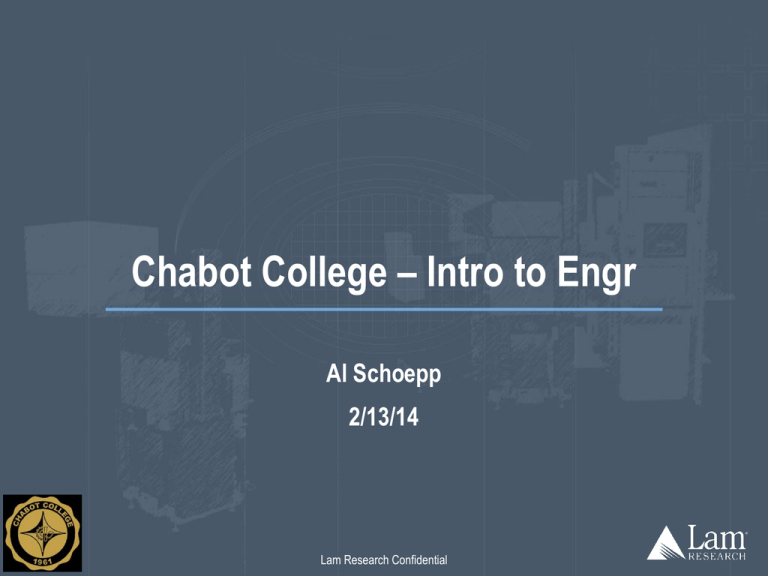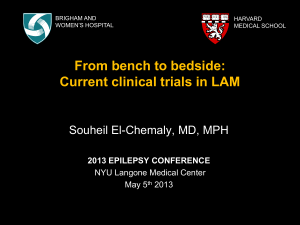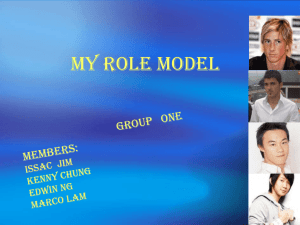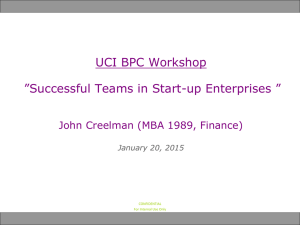Lecture Presentation
advertisement

Chabot College – Intro to Engr Al Schoepp 2/13/14 Lam Research Confidential Outline Introduction Industry Overview Lam Research: Products & Technology Future Technology Challenges College Programs Overview Summary Q&A Slide - 2 Lam Research Confidential Meet the CTO’s Team Al Schoepp Senior Technical Director San Jose, California Slide - 3 Responsible for the hardware support for technology investigations, as well as investigating novel chamber materials and novel hardware designs for future generations of semiconductor equipment. Earned his bachelor’s in mechanical engineering from University of Missouri-Rolla and his masters in mechanical engineering from Stanford University, the emphasis of his graduate work was in high temperature gas dynamics and product design. Has been involved in semiconductor equipment development for the last 29 years, his first 6 years were with Watkins-Johnson where he was the chief designer and architect of the WJ-999 CVD system, then a 4 year stint at Novellus where he worked on the SPEED product development , while the last 19 years have been with Lam Research mainly focused in New Product Development. Originally from New Athens, Illinois, Al currently resides in Ben Lomond, California with his wife, Anne and their five children. Enjoys weightlifting, playing music, archery, camping, hunting, making sausage, and building unique items. Lam Research Confidential How do I explain to my parents what Lam Research does? Power Management NAND Flash Graphics Engine Multi-core CPU Slide - 4 Lam Research Confidential Wafer Fabrication Equipment Lam Research manufactures the equipment that is used for some of the processes needed to create semiconductor integrated circuits (chips) Slide - 5 Lam Research Confidential Semiconductor Basics Pure silicon ingots What is a Semiconductor? – Semiconductor = “partial conductor” • Pure silicon is highly resistive • Impure silicon can be a conductor – This tailoring of resistances and materials can be used to make nanoscopic electronic switches (transistors) – Transistors can be “wired” together to make useful devices – Integrated circuits are made on silicon wafers 300 mm Wafer Single Chip (or Die) (fingernails grow @ ~1nm/sec) Slide - 6 Lam Research Confidential 36 nm © 2004 IEEE (IEDM 2004) For comparison, the diameter of a red blood cell is about 8 µm = 8,000 nm Single Transistor Relative Size of Wafer Fabrication Equipment (WFE) Market Electronic Equipment $1,600 Billion Microprocessors Major Market Segments Computing Automotive Consumer Communication NAND Flash Semiconductors $300 Billion Industrial/Military Buildings, Computers, and Equipment DRAM Capital Spending $60 Billion WFE $30B Source: Dataquest, Lam Internal Slide - 7 Lam Research Confidential Lam Research Customers by Region Top Three Customers China Europe Japan Korea N. America Singapore Taiwan Not all customers are listed Slide - 8 Lam Research Confidential Lam Products Introduction Wafer Fabrication Applications Hundreds of steps are needed to create an integrated circuit Cross-Section of a Logic Device Process Applications: Ion Implantation BEOL: Thermal Processes Back-End-of-Line (Interconnect) Lithography Etch Strip Clean Deposition Chemical-Mechanical Planarization (CMP) Metrology Inspection © 2004 IEEE (IEDM 2004) FEOL: Front-End-of-Line (Transistors) Individual Transistor © 2004 IEEE (IEDM 2004) Slide - 10 Lam Research Confidential Lam Research Applications Lam’s Product Leadership Installed Base Support Etch Deposition Strip & Clean #1 in Conductor #1 in Copper ECD #1 in W-CVD #2 in PECVD #2 in HDP-CVD #1 in Dry Strip #2 in SW Clean Spares Productivity Services Performance Upgrades Reliant Systems 6% – 8% of WFE 5% – 6% of WFE World-class customer support #2 in Dielectric 12% – 14% of WFE Silicon & Industrial Apps Silfex and Peter Wolters Lam Research serves ~26% of total wafer fab equipment market Source: Leadership positions based on Gartner Dataquest and company data specific to 2012 shares; WFE percentages based on Gartner Dataquest and company data ECD = electrochemical deposition; CVD = chemical vapor deposition; PECVD = plasma-enhanced CVD; HDP-CVD = high-density plasma CVD; SW = single-wafer Slide - 11 Lam Research Confidential Wafer Fabrication Process Steps Example Incoming Wafer Deposition Lithography Etch Photoresist Put down the film to be patterned Slide - 12 Create the pattern mask Strip Clean Remove photoresist Remove residues and particles Residues Selectively remove film to define features Lam Research Confidential Deposition Processes Plasma Enhanced Chemical Vapor Deposition (PECVD) Gnd Showerhead Supply Gas Mix Supply Energy for Reaction Heat or/and Plasma Reaction Wafer (PECVD) RF Gnd Example: SiH4 + NH3 SiN Slide - 13 Lam Research Confidential 13 Lam Research Deposition Product Portfolio ECD W-PNL/CVD PECVD electrochemical deposition tungsten pulsed nucleation layer/chemical vapor deposition plasma-enhanced chemical vapor deposition SABRE® Product Family ALTUS® Product Family VECTOR® Product Family Gapfill HDP-CVD Slide - 14 UVTP high-density plasma chemical vapor deposition ultraviolet thermal processing SPEED™ Product Family SOLA® Product Family Lam Research Confidential Future Technology Challenges Slide - 15 Lam Research Confidential Transistors per Die How and Why Did Moore’s Law Happen? 10 10 10 10 10 10 10 10 10 9 8 64M 16M 7 4M 1M 6 Pentium III Pentium II i7 Atom i386 i286 4K 8086 1K 3 Duo i486 64K 16K 4 1G 4G Pentium 256K Fairchild IC (1961) 5 256M 128M 512M 2G 4004 8080 100 10 Intel Core i7-980X MPU (2010) 1 1960 1970 1980 1990 2000 2010 Sources: Gordon Moore, ISSCC 2003 & Intel 2010 Fairchild/Computer History Museum, Mountain View, CA Slide - 16 Lam Research Confidential Moore’s 1965 Article Predicts Why It Happens? Source: Gordon E. Moore, Electronics, vol. 39, no. 8 (1965) Slide - 17 Lam Research Confidential What if everything followed Moore’s Law… Moore’s Law Comparison: Semiconductors vs. Automobiles Year Speed Capacity Cost Automobile ~200 mph 17 mpg $8500 Integrated Circuit 8 MHz (Intel 286) 130,000 transistors (Intel 286) $128 (64K DRAM Module) Integrated Circuit 4 GHz (Intel Haswell) 1,400,000,000 (Intel Haswell) $30 (8GB DRAM Module) “Moore’s Law” Automobile 100,000 mph 180,000 mpg < $0.02 1983 2013 Slide - 18 Lam Research Confidential ($20,000 in 2013 $) What if everything followed Moore’s Law… Moore’s Law Comparison: Semiconductors vs. Automobiles Year Speed Capacity Cost Automobile ~200 mph 17 mpg $8500 Integrated Circuit 8 MHz (Intel 286) 130,000 transistors (Intel 286) $128 (64K DRAM Module) Integrated Circuit 4 GHz (Intel Haswell) 1,400,000,000 (Intel Haswell) $30 (8GB DRAM Module) “Moore’s Law” Automobile 100,000 mph 180,000 mpg < $0.02 1983 2013 Slide - 19 Lam Research Confidential ($20,000 in 2013 $) What if everything followed Moore’s Law… Moore’s Law Comparison: Semiconductors vs. Automobiles Year Speed Capacity Cost Automobile ~200 mph 17 mpg $8500 Integrated Circuit 8 MHz (Intel 286) 130,000 transistors (Intel 286) $128 (64K DRAM Module) Integrated Circuit 4 GHz (Intel Haswell) 1,400,000,000 (Intel Haswell) $30 (8GB DRAM Module) “Moore’s Law” Automobile 100,000 mph 180,000 mpg < $0.02 1983 2013 Drive around the world in 15 minutes … … on a pint of gas … Slide - 20 Lam Research Confidential ($20,000 in 2013 $) … and the car would cost less than two cents. Summary – Semi Industry Moore’s Law continues to drive the Semiconductor (& Equipment) Industry and enables today’s and tomorrow’s electronic breakthroughs. Semiconductor Equipment continues to require technology innovation. – Must stay 1-2 generations ahead of the device makers. The challenges are continuing to increase with each new device generation. – There are a lot of hard problems that need to be solved in the coming years. A wide variety of technical disciplines are needed to be able to solve these problems: – Engineering, chemistry, physics, devices (EE), mathematics, materials, flow/transport, RF power, chamber design, software, operations research, control systems, ergonomics, data analysis, sensors, … Lot’s of non-technical disciplines are needed as well: – Business management, human resources, finance, operations, manufacturing, supply chain, information technology, investor relations, marketing, … Lam is a great place to work – full time or as a intern Slide - 21 Lam Research Confidential College Programs Overview Slide - 22 Lam Research Confidential Mission, Vision, and Core Values Mission Lam Research is dedicated to the success of our customers by being the world-class provider of innovative technology and productivity solutions to the semiconductor industry Vision Core Values Number one in customer trust Achievement Number one in market share Honesty and integrity A company where successful people want to work Innovation and continuous improvement Mutual trust and respect Best-in-class products and services Open communication Financial performance to: Ownership and accountability Teamwork Think: customer, company, individual – Fund the solutions our customers require – Provide the return our shareholders expect Slide - 23 Lam Research Confidential Lam Research More than 30 years as a major supplier of wafer fabrication equipment and services to the global semiconductor industry Locations – 17 Countries Worldwide Over 6,600 employees worldwide Lam Research looks for interns, NCGs, MBAs, advanced degrees, and post-doctorates with the following attributes: – – – – – – – – – – – Alignment with Lam’s Core Values A Relevant Educational Background Relevant Experience (internship experience) Technical Capability/Industry/Business Knowledge Innovation/Creativity Achievement Interpersonal Skills/Teamwork Communication Skills Project Management Community Involvement Leadership Program/Skills Slide - 24 Lam Research Confidential College Programs Overview – NCG’s New College Graduate (NCG) Criteria – Must be hired within 24 months of graduation – OUTSTANDING ACADEMIC RECORD (Great GPA) – Degree in one or more of the following subjects: • Chemistry (Organic, Inorganic) • Engineering (Chemical, Computer, Electrical, Industrial, Manufacturing, Mechanical) • Finance • Human Resources • Information Systems • Management Information Systems • Marketing • Materials Science • Physics • Plasma Physics • Software Development and Engineering • Supply Chain NCG 2013 – hired over 100 NCG’s globally Slide - 25 Lam Research Confidential College Programs Overview – Internships Internship Program – Summer and/or co-op employment for students – Hands-on business experiences that complement academic studies and prepare for real-world situations – Project-based with a focus on learning and development – $2500 Core Values Scholarship (2 Interns each Summer) – Keynote Speaker Series, Social Events and Poster Session Internship Criteria – Must be currently enrolled in a University program – Pursuing a B.S., M.S., MBA, or Ph.D. in engineering, science, or a business related field – Outstanding academic record Summer 2013 – hired over 75 Interns in US College Recruiter: Jennifer Lu Email: Jennifer.Lu@lamresearch.com for any additional questions Slide - 26 Lam Research Confidential Advice from Al Need to find your own path – OK to try multiple areas – Strengthen your weaknesses, but go with your strengths Absolutely do project courses and get an internship at a company – Need to validate your assumptions about interests – Need to have failures…everything works on paper…. Must constantly be learning – even after college – Problems are very diverse and multi disciplined.. – All of the easy stuff has been done already…. It is a marathon, not a sprint – Hate the news about “get rich quick” invention…..very rare – Usually takes years of continuous work to bring solutions/products to market Slide - 27 Lam Research Confidential Q&A







